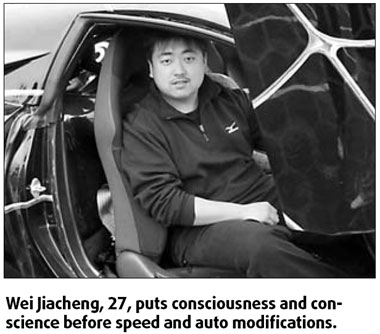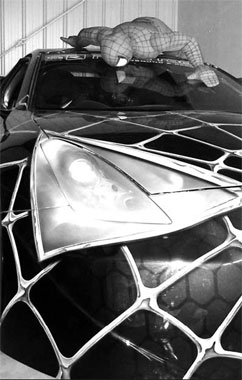Spiderman racer casts web of safety
Jubilant cheers and applause exploded throughout the automobile base in the West International Trade Center in Fengtai district in early June as the motor graffiti competition got underway. Spider man - a 44-million-yuan ($6.50 million) modified motor favorite of the Sunshine Auto Club, with its seven coats of paint, Lambo door, Altezza headlights, 600,000-yuan stereo, and high-performance chassis - had just arrived, and was inching its way to the belted graffiti square.

It was this car and its driver, out of all 200 participant auto teams from around the nation, that spectators most anticipated. Initially random shouts soon converged in the one clear chant: "Wei Jiacheng! Wei Jiacheng!"
One of the man's many admirers matter-of-factly stated: "He is the god of cars."
Wei, 27, denied, perhaps a touch too vehemently, this deification, retorting: "Michael Schumacher has just been crowned the king of drivers."
But Wei's fans adore him for more than just his racing prowess. Four years ago, when Wei was a sophomore majoring in International Business Management at the University of Hong Kong, he joined a small acrobatic motor performance group in order to pay his expensive tuition fees. Membership of this entertainment group enabled Wei to acquire a temporary Federation of International Sports Automobiles (FISA) speed racing license.
When, during one of the rookie races, his oil pipe blew Wei pushed his car the remaining 200m to the finish line.
"I had to cross the finish line because I never want to be a Did Not Finish (DNF) driver," Wei explains.
|
Spider man is a 44-million-yuan modified motor favorite of the Sunshine Auto Club founded by Wei Jiacheng. Photos courtesy of Wei Jiacheng |
Four months later, Wei earned his laurels as "god of cars" when he drove through thick black smoke and spun at maximum speed in order to stop the leading car (whose front left wheel had exploded five laps from the finish) from crashing into the press box. Other cars followed Wei's heroic example by cutting their engines, thus ending the race without a champion.
"A speed chaser can easily overtake an opponent with a burst tire, but Wei chose to forfeit the championship and save lives," says Chen Yu, editor of China Youth Online's motor channel and friend of Wei's.
Wei left Hong Kong for Beijing shortly after graduation with the intention of spreading his racing philosophy. Wei's maxim: A racer's consciousness and conscience come before speed and auto modifications. He made it his job to disseminate this positive racing policy among young adults.
Earlier this decade, street racing was rampant in Beijing. Some were spontaneous contests between easily incensed motorists; others were organized well in advance. These "suicide racers" as Beijingers dubbed them, zipped haphazardly through traffic (sometimes passing 43 cars in one minute) on the 2nd Ring Road.
"Injury or death are the all-too common consequences of arbitrary street racing," Wei states, grimly. He consequently challenged these illegal speed demons - not to flaunt his superiority, but to show them that there is more to motor racing than just leaning on the gas pedal, and to convince them to apply for racing licenses. Wei, still unbeaten, holds records at three Beijing race tracks.
Shooting began on a television series about Wei's racing career on the grand opening day of the race track in Pinggu district that Wei had convinced the government to build.
Wei was also one of the founders of the Sunshine Auto Club, whose membership of 20 auto-racing teams and 30,000 members was quick to provide relief to the earthquake-affected region of Sichuan province.
The young racing star, who keeps photos of his parents in his car, is still single , but contends: "If I had a girlfriend, I'd give her my license, hang up my racing stripes, and become a full-time trainer." Whether as racer or coach, Wei's sustained presence in the auto world is assumed by all concerned.
(China Daily 06/30/2008 page8)















